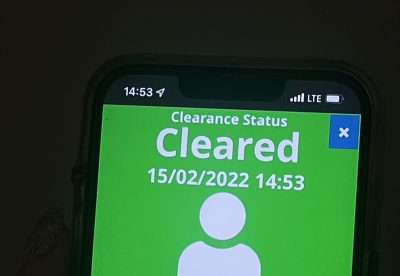
Boston University will return to its pre-pandemic visitor policy and make some exemptions to its mask mandate as part of the University’s COVID-19 relinquishing measures starting Feb. 21.
In an email sent out Feb. 15, BU announced that undergraduates will return to once weekly testing and a green badgewill no longer be required to enter residences or dining halls.
In addition, members outside the BU community are now allowed to enter campus buildings, and are encouraged, but not required, to be vaccinated.
“This is a recommendation that we believe keeps the individual and our population safe,” wrote Judy Platt, executive director of Student Health Services and Chief Health Officer, in an email.
While BU eases restrictions at student accommodations, the BU Fitness and Recreation Center, Agganis Arena and the John & Edgar Booth Theatre, among other campus buildings, will still require proof of vaccination for the general public.
Platt wrote these locations have different protocols set in place to acknowledge external public health requirements, while noting that some classrooms will still be checking students’ green badges at the professor’s discretion.
“With student case positivity percentages larger than the employee percentages, the classroom setting is more likely to have someone in attendance who is COVID-positive,” she wrote.
The update in University health guidelines comes a little over two weeks after the Baker administrationurgeduniversities in the state to ease COVID-19 restrictions.
向下的混乱关系COVID-19病例nd in BU since mid-January, data shows. BU had a positivity rate of 0.46% on Feb. 14.
Some students reacted positively to the recent policy changes.
“I did appreciate that they kept the mask guideline in place,” said Treyton Littlejohn, a sophomore in the College of General Studies. “I know that some states have dropped their statewide mandates but personally still happy to continue to wear a mask.”
As of today, 32 states have either loosened or dropped their mask mandates altogether. In Massachusetts, effective Feb. 15, public health officials no longerrecommendindoor mask mandates for vaccinated individuals.
BU will allow individuals presenting or lecturing in a classroom to do so without wearing a mask, as stated in the email sent out to the BU community.
Cindy Hu, a freshman in the College of Arts and Sciences, said whether a professor should wear a mask or not depends on the size of the class.
“If it’s a super small classroom… and if the professor’s just not wearing a mask, then maybe not,” Hu said. “But if it’s a large lecture hall and the professor’s standing on a stage, I think it’s okay.”
Hu also said she preferred getting tested once a week, but noted the ease with which students can fabricate negative test results through unsupervised testing, which BU recentlyputin place.
“I almost feel like I’m going there like every other day,” Hu said. “But then I guess one thing with remote testing is that I think some people might not test… you can literally take the Q-tip out and put it in without sticking it in your nose.”
Littlejohn said he is concerned about outside visitors not having to demonstrate proof of vaccination to enter residence halls, but added that the recent drop in Omicron cases gives him some peace of mind.
“It would be a little concerning, though, if next week, there’s a bunch of Northeastern [University] guys hanging out the dorm without their masks on,” he said.
Platt said the University “plans to evolve its protocols” as the semester progresses.
“We are actively looking at our case counts, test percent positivity, transmission dynamics on our campus,” she wrote. “We have tried to balance the variations in risk across our campus and strived to keep safety at the forefront.”
Campus EditorJesús Marrero Suárezand Associate Campus EditorSangmin Songcontributed to the reporting of this article.






Things should loosen but watch for the spring break bump when people go to Florida and come back spread it. By April 1 you might see that rate back at 5%.
If it were me – cut spring break to 2 long weekends and give other days off as wellness days to keep people on campus.